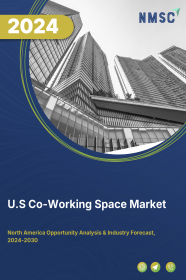
The U.S. Co-Working Space Market by Space Type (Shared Open Spaces, Enclosed Private Suites, Virtual Office Solutions, Event/Meeting Facilities), by Membership Type (Hot Desks, Dedicated Desks, and Others), by Business Type (Standard Coworking, and Others), by Business Model (Direct Ownership/Operation, and Others), by End User (Freelancers/Remote Workers, and Others), by Industry Vertical (Technology & IT Services, and Others) - Opportunity Analysis and Industry Forecast, 2024–2030
Industry: ICT & Media | Publish Date: 04-Nov-2025 | No of Pages: 157 | No. of Tables: 120 | No. of Figures: 65 | Format: PDF | Report Code : IC2016
Industry Overview
The U.S. Co-Working Space Market size was valued at USD 2.1 billion in 2023, and is predicted to reach USD 7.1 billion by 2030, at a CAGR of 18.7% from 2024 to 2030. Co-working space represents a dynamic and adaptable solution to the evolving needs of businesses. These shared work environments offer flexibility in lease terms and space requirements, appealing particularly to startups and small enterprises seeking to avoid the upfront costs associated with traditional offices. The communal atmosphere encourages networking and collaboration among professionals from diverse fields, fostering innovation and creativity.
Equipped with modern amenities and strategically located, managed workspaces provide cost-effective, scalable, and accessible alternatives for companies seeking a central presence without the constraints of long-term leases. The industry has experienced significant growth as businesses recognize the benefits of this model, embracing the collaborative opportunities and resource-sharing inherent in co-working spaces.
Corporate Embrace of Hybrid Work Models Fueling Demand for Flexible Workspaces
Large enterprises across the U.S. are increasingly incorporating coworking spaces into their real estate and operational strategies to enhance flexibility, reduce fixed costs, and respond to rapidly changing business needs. Sectors such as finance, technology, legal, consulting, and creative services are leveraging these spaces for project-based teams, temporary offices, regional satellite hubs, and client-facing locations. Modern U.S. coworking operators provide enterprise-grade infrastructure, including secure digital access, advanced IT and communication networks, fully serviced meeting rooms, and customizable office layouts. This allows companies to scale their operations quickly without committing to long-term leases. The combination of cost efficiency, rapid deployment, and employee satisfaction is driving strong corporate adoption and sustaining demand for hybrid-ready, flexible workspaces.
Post-Pandemic Hybrid Work Culture Driving Regional Workspace Diversification
The widespread adoption of hybrid and remote work arrangements has shifted the demand for office space from centralized city-core locations to more distributed and accessible networks across the U.S. Professionals increasingly prefer coworking facilities closer to residential neighborhoods to reduce commuting time while maintaining productivity, collaboration, and well-being. In response, coworking operators are expanding into secondary cities, suburban areas, and emerging business districts, offering ergonomic designs, high-speed internet, wellness amenities, and collaborative spaces. These localized and flexible solutions enable organizations to retain talent, improve work-life balance, and maintain operational continuity. The result is a more decentralized coworking landscape that supports regional workforce needs while fostering collaboration and innovation.
Zoning Restrictions and Uneven Infrastructure Slowing Market Expansion
Despite strong demand in major metropolitan areas, expansion into smaller towns, suburban regions, and rural areas faces challenges due to zoning complexities and uneven infrastructure. Local regulations can create ambiguities regarding the operation of coworking spaces in mixed-use or residential-adjacent properties, causing delays in approvals and increasing compliance costs. In addition, inconsistent broadband connectivity, power reliability, and limited access to high-quality utilities in non-urban regions hinder the replication of urban-standard coworking facilities. Until municipalities streamline regulations and invest in infrastructure, scaling flexible workspaces across all regions of the U.S. will remain a significant challenge for operators.
Strategic Growth Potential in Innovation Hubs and Academic Ecosystems
U.S. innovation districts, research parks, and university-driven startup ecosystems present significant growth opportunities for coworking operators. Cities such as San Francisco, Boston, Austin, and Seattle are magnets for startups, scale-ups, and knowledge-based enterprises seeking collaborative, affordable, and technology-enabled workspaces. Operators can tailor offerings to these clusters by providing flexible memberships, access to R&D facilities, mentorship programs, and partnerships with accelerators or incubators. Coworking spaces embedded in such ecosystems facilitate networking, knowledge exchange, and cross-industry collaboration, positioning themselves as integral platforms for business growth. Supportive government policies around entrepreneurship, digitalization, and sustainability further strengthen the long-term viability of coworking in these high-potential regions.
Competitive Landscape
The U.S. co-working space industry comprises of various companies including IWG plc, WeWork Inc., Industrious, Office Evolution, Premier Workspaces, Workstyle / Workstyle Flexible Spaces, Venture X, Intelligent Office, Expansive, Inc., LocalWorks, Cohatch, Serendipity Labs, Lucid Private Offices, Convene Inc., CommonGrounds Workplace, and others.
The U.S Co-Working Space Market Key Segments
By Space Type
-
Shared Open Spaces
-
Enclosed Private Suites
-
Virtual Office Solutions
-
Event/Meeting Facilities
By Membership Type
-
Hot Desks
-
Dedicated Desks
-
Private Office Leases
-
Hybrid Flex Passes
By Business Type
-
Standard Coworking
-
Premium Managed Offices
-
Niche/Specialized Spaces
By Business Model
-
Direct Ownership/Operation
-
Franchise/Partnership
-
Real Estate Collabs
By End User
-
Freelancers/Remote Workers
-
Startups (<10 Employees)
-
SMEs (10–250 Employees)
-
Large Enterprises (>250)
By Industry Vertical
-
Technology & IT Services
-
Financial & Professional
-
Healthcare & Life Sciences
-
Manufacturing & Logistics
-
Public Sector & Education
-
Others
Key Players
-
IWG plc
-
WeWork Inc.
-
Industrious
-
Office Evolution
-
Premier Workspaces
-
Workstyle / Workstyle Flexible Spaces
-
Venture X
-
Intelligent Office
-
Expansive, Inc.
-
LocalWorks
-
Cohatch
-
Serendipity Labs
-
Lucid Private Offices
-
Convene Inc.
-
CommonGrounds Workplace
Report Scope and Segmentation
|
Parameters |
Details |
|
Market Size in 2023 |
USD 2.1 Billion |
|
Revenue Forecast in 2030 |
USD 7.1 Billion |
|
Growth Rate |
CAGR of 18.7% from 2024 to 2030 |
|
Analysis Period |
2023–2030 |
|
Base Year Considered |
2023 |
|
Forecast Period |
2024–2030 |
|
Market Size Estimation |
Billion (USD) |
|
Growth Factors |
|
|
Companies Profiled |
15 |
|
Market Share |
Available for 10 companies |
|
Customization Scope |
Free customization (equivalent up to 80 working hours of analysts) after purchase. Addition or alteration to country, regional, and segment scope. |
|
Pricing and Purchase Options |
Avail customized purchase options to meet your exact research needs. |

















 Speak to Our Analyst
Speak to Our Analyst

























